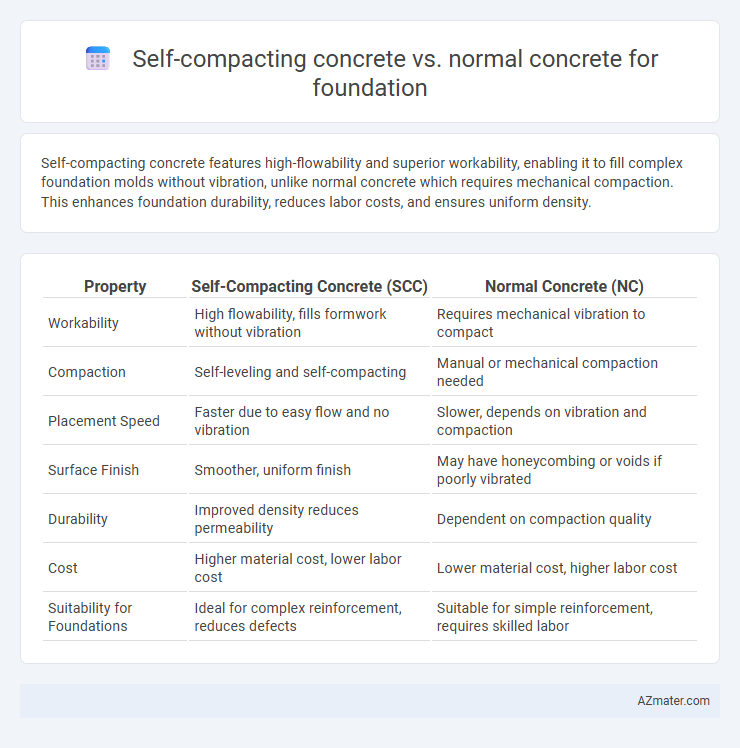Self-compacting concrete features high-flowability and superior workability, enabling it to fill complex foundation molds without vibration, unlike normal concrete which requires mechanical compaction. This enhances foundation durability, reduces labor costs, and ensures uniform density.
Table of Comparison
| Property | Self-Compacting Concrete (SCC) | Normal Concrete (NC) |
|---|---|---|
| Workability | High flowability, fills formwork without vibration | Requires mechanical vibration to compact |
| Compaction | Self-leveling and self-compacting | Manual or mechanical compaction needed |
| Placement Speed | Faster due to easy flow and no vibration | Slower, depends on vibration and compaction |
| Surface Finish | Smoother, uniform finish | May have honeycombing or voids if poorly vibrated |
| Durability | Improved density reduces permeability | Dependent on compaction quality |
| Cost | Higher material cost, lower labor cost | Lower material cost, higher labor cost |
| Suitability for Foundations | Ideal for complex reinforcement, reduces defects | Suitable for simple reinforcement, requires skilled labor |
Introduction to Self-Compacting Concrete and Normal Concrete
Self-compacting concrete (SCC) is a highly flowable, non-segregating concrete that can spread into formwork and encapsulate reinforcement without mechanical vibration, making it ideal for complex foundation structures. Normal concrete (NC) requires mechanical compaction to eliminate air pockets and ensure proper consolidation, which can be labor-intensive and less effective in congested reinforcement zones. SCC enhances durability and surface quality in foundations by reducing voids and segregation, whereas NC relies on skilled labor and adequate vibration for optimal performance.
Key Differences Between Self-Compacting and Normal Concrete
Self-compacting concrete (SCC) differs from normal concrete in its ability to flow and fill formwork without mechanical vibration, providing superior workability and finish quality in foundation construction. SCC contains higher dosage of chemical admixtures like superplasticizers to enhance flowability and reduce segregation, whereas normal concrete relies on vibration to compact and eliminate air voids. The key benefits of SCC include reduced labor costs, faster placement times, and improved durability, contrasting with normal concrete's traditional application requiring more manual intervention and potential for honeycombing.
Composition and Mix Design Comparison
Self-compacting concrete (SCC) differs from normal concrete primarily in its mix design, incorporating higher cement content, fine fillers like silica fume, and superplasticizers to achieve high flowability without segregation, enabling it to fill complex foundation molds without vibration. Normal concrete typically contains a balanced proportion of coarse aggregates, cement, water, and minimal admixtures, relying on mechanical vibration for compaction. The enhanced flowability and stability of SCC result from optimized particle packing and reduced water-cement ratio, while normal concrete emphasizes workability through water content and aggregate gradation, impacting the foundation's structural integrity and durability.
Workability and Placement Efficiency
Self-compacting concrete (SCC) significantly enhances workability due to its high flowability and self-leveling properties, eliminating the need for mechanical vibration during foundation placement. Normal concrete requires additional labor and vibration to achieve compaction, often leading to inconsistent density and potential voids. The placement efficiency of SCC reduces construction time and labor costs while ensuring uniform consolidation, making it superior for complex foundation forms.
Strength and Durability for Foundations
Self-compacting concrete (SCC) offers superior strength and durability compared to normal concrete, making it ideal for foundation applications where uniform compaction and minimal voids are critical. SCC achieves high compressive strength through its optimized mix design and fine particle distribution, ensuring consistent load-bearing capacity and improved resistance to cracking and environmental degradation. Enhanced durability properties of SCC, such as reduced permeability and increased resistance to chemical attacks, contribute to longer-lasting foundations in harsh soil and moisture conditions.
Curing Requirements and Process
Self-compacting concrete (SCC) requires meticulous curing with controlled moisture retention to maintain its high workability and prevent surface defects, often achieved through continuous wet curing or curing compounds. Normal concrete demands standard curing practices, typically involving water spraying or covering with wet materials for at least 7 days to ensure adequate hydration and strength development. The precise curing of SCC enhances its durability and uniformity, whereas improper curing in normal concrete may lead to reduced structural integrity in foundation applications.
Cost Implications and Economic Analysis
Self-compacting concrete (SCC) reduces labor costs and construction time due to its high flowability and ability to fill complex formwork without vibration, leading to substantial savings on large foundation projects compared to normal concrete. Initial material costs for SCC are higher, primarily because of increased cement and chemical admixture content, but these costs are often offset by reduced labor and equipment expenses. Economic analysis shows SCC can provide a better return on investment in high-complexity or time-sensitive foundation works, despite higher upfront expenditure.
Applications in Foundation Construction
Self-compacting concrete (SCC) enhances foundation construction by improving flowability and filling complex formworks without mechanical vibration, reducing labor costs and time. SCC is ideal for foundations with dense reinforcement or limited access, ensuring uniform compaction and increased structural integrity. Normal concrete requires vibration and is more suitable for straightforward foundation designs with accessible formwork and lower reinforcement density.
Environmental Impact and Sustainability
Self-compacting concrete (SCC) reduces environmental impact by minimizing the need for mechanical vibration, resulting in lower energy consumption and noise pollution compared to normal concrete used in foundations. SCC often incorporates supplementary cementitious materials such as fly ash or slag, which reduce cement content and associated CO2 emissions, enhancing sustainability. The improved durability and reduced permeability of SCC foundations also contribute to longer service life, lowering the environmental burden over time.
Choosing the Right Concrete for Foundation Projects
Self-compacting concrete (SCC) offers superior flowability and reduced segregation compared to normal concrete, making it ideal for complex foundation forms and congested reinforcement. SCC enhances durability and surface finish while minimizing labor costs and vibration requirements during placement. For foundation projects requiring high precision and reduced construction time, SCC is often the preferred choice over conventional concrete.

Infographic: Self-compacting concrete vs Normal concrete for Foundation
 azmater.com
azmater.com